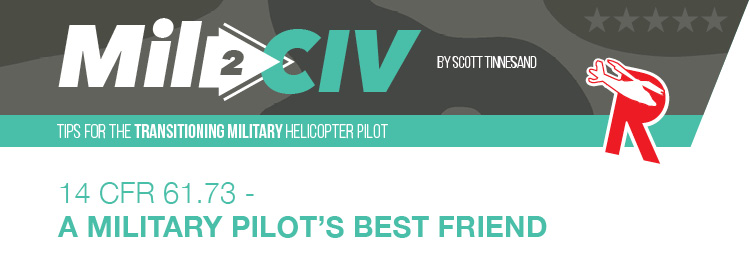|
Dec
07
2020
|
|
Posted 5 years 58 days ago ago by Admin
|
|

The regulation is officially titled “Military pilots or former military pilots: Special rules,” but it’s best known by the acronym “MilComp,” short for military competency. It outlines the eligibility and requirements for a military pilot to obtain FAA pilot certifications based on their flight and ground training with the armed forces. Simply put, if you have graduated from a military flight school and haven’t been removed from flying status because of lack of proficiency or disciplinary action, you are eligible for an FAA commercial pilot certificate, instrument rating, flight instructor certificate (for those who were instructor pilots or examiners) and maybe even a type rating.
Here’s the best thing of all: there is no practical test (checkride) with a designated pilot examiner (DPE) or FAA inspector, grilling you for hours during the oral and then requiring you to fly all the maneuvers in the PTS or ACS to standard. The FAA has decided that you already accomplished that while in the military. You are only responsible to take and pass an FAA knowledge test (often called a “written test”) and provide the right documentation from your branch of service. There are two knowledge tests: the Military Competence Non-Category (MCN) and the Military Competence Instructor (MCI). In the past, there were specific tests for airplane or helicopter, but they have been replaced with the MCN.
The MCN is a 50-question test allowing 2 hours to complete; the MCI is a 125-question test with 3 hours to complete. All FAA knowledge tests use only multiple-choice type questions and randomly select questions for each test from a bank of questions that numbers in the hundreds. Although the FAA certainly did not intend for the knowledge tests to be a check-the-box step during pilot certification, they are often nothing more than an exercise in memorization. Years ago, pilots would buy one of many prep books for the FAA written test that were available at nearly every airport and flight school. Now, most pilots download an app and study for their test on a tablet or laptop. The methodology is to review the hundreds of questions and correct answers, then lather, rinse, and repeat until you can take a practice test and pass with flying colors. Even though the FAA does not publish or provide the bank of test questions to anyone, these training resources somehow have the questions and answers that will likely appear on your test.
All of the FAA’s knowledge tests are administered at FAA-designated computer testing centers operated by a company called PSI. You can find one of these testing centers at nearly every larger airport or flight school in the country. Each test usually costs $150 to take but they are available with no fee for military members and retirees at and near many military installations.
Another great aspect of the §61.73 rule is that there is no time limit on being a current or former U.S. military pilot in applying for and being issued a certificate. This means that decades can pass since your military flying days and you are just as eligible as the newly retired military pilot or graduate from a military flight school. Also, the MCN and MCI are some of the few tests that do not require a flight or ground instructor’s endorsement to schedule and take the test. You also must have an FTN (FAA Tracking Number) prior to scheduling the knowledge test.
After you have taken the knowledge test and passed, the testing center will give you a sheet of paper with your test results. Now all you have to do is find a DPE with MilComp privileges or contact your local FAA Flight Standardization District Office (FSDO) and schedule a meeting to complete the paperwork. In addition to your written test results, you will need to bring your military flight documentation (it is very different depending on your service branch) and complete an IACRA (Integrated Airman Certification and Rating Application) through the FAA’s online program.
If any of this is sounding difficult or forbidding, come and join us at the 2021 Heli-Expo Mil2Civ Transition Course and we will help you every step of the way! Here’s an added bonus: if any of our Mil2Civ attendees arrive with their knowledge test results and other required paperwork in hand, I will gladly process their application and issue their FAA certificates on the spot. If there are any questions or if you’d like to explore the possibility of completing your MilComp at Heli-Expo 2021, please email me at [email protected].
About the author: Scott is an Experimental test pilot and instructor pilot flying AH-64 Apaches, AH-6 Little Birds, and UAVs with The Boeing Company. During his 33-year aviation career, he has been an Army pilot, civilian EMS pilot, flight instructor, and test pilot. He is an FAA designated pilot examiner, FAA Safety Team representative, volunteer, and active pilot mentor as well as a co-chair of the Mil2Civ transition course at HAI’s Heli-Expo.